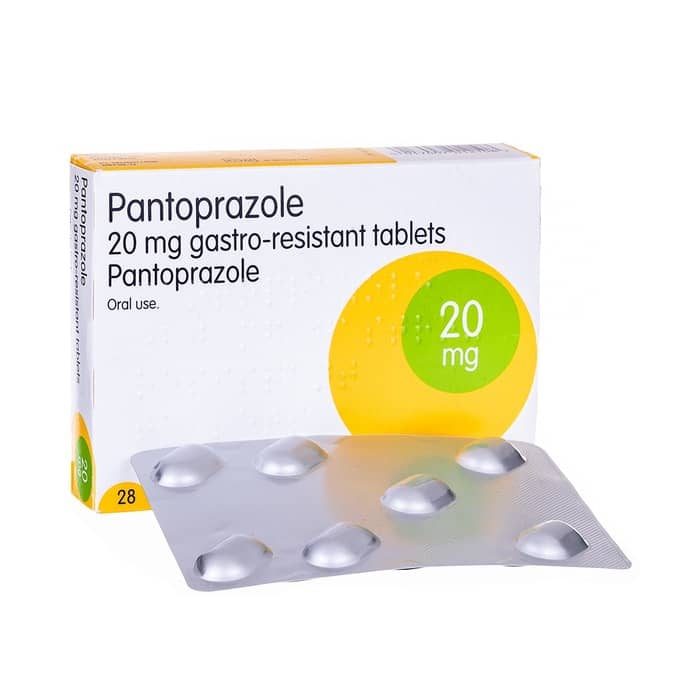Pantoprazole
Used for the treatment of Acid Reflux£ 16.99 – £ 19.99
Buy Pantoprazole EU | What is Pantoprazole ?
Pantoprazole is a proton pump inhibitor (PPI) medication that is used to treat conditions such as gastroesophageal reflux disease (GERD), erosive esophagitis, and Zollinger-Ellison syndrome. It works by reducing the amount of acid produced in the stomach, which helps to relieve symptoms such as heartburn, acid reflux, and indigestion. As a proton pump inhibitor, pantoprazole targets the proton pumps in the stomach lining that are responsible for acid production. By inhibiting these pumps, the medication significantly reduces the secretion of gastric acid into the stomach, leading to a decrease in acidity levels. This reduction in stomach acid is particularly beneficial in managing conditions where excess acid production contributes to symptoms and complications. Gastroesophageal reflux disease (GERD) is characterized by the backflow of stomach acid into the esophagus, causing symptoms like heartburn and regurgitation. Erosive esophagitis involves inflammation and damage to the esophagus due to stomach acid exposure. Zollinger-Ellison syndrome is a rare condition characterized by tumors in the pancreas or duodenum, leading to excessive gastric acid production.How does Pantoprazole work ?
Pantoprazole works by inhibiting the activity of the proton pump in the stomach, which is responsible for producing acid. By blocking this enzyme, Pantoprazole reduces the amount of acid that is produced, which helps to alleviate symptoms of acid reflux, heartburn, and indigestion. Pantoprazole is a type of PPI medication that is highly effective at reducing the production of stomach acid. It is commonly used to treat conditions such as GERD and erosive esophagitis, and is also effective at treating symptoms of acid reflux and heartburn. The reduction in stomach acid is particularly beneficial for individuals experiencing conditions such as gastroesophageal reflux disease (GERD), where the lower esophageal sphincter fails to prevent the backflow of stomach acid into the esophagus. This backflow causes symptoms such as heartburn, regurgitation, and chest discomfort. In cases of erosive esophagitis, where inflammation and damage to the esophagus occur due to prolonged exposure to stomach acid, Pantoprazole aids in the healing process by lowering acid levels.How To Take Pantoprazole ?
Pantoprazole is typically taken once per day, either with or without food. It is important to follow your doctor’s instructions regarding the dosage and frequency of the medication, and to take the medication at the same time each day to ensure consistent and effective treatment. It is important not to crush or chew Pantoprazole tablets, as this can reduce the effectiveness of the medication. Instead, swallow the tablets whole with a glass of water. Adherence to the prescribed dosage and administration guidelines is essential for achieving optimal results in managing conditions such as gastroesophageal reflux disease (GERD) and erosive esophagitis. Consistency in taking Pantoprazole helps maintain a stable concentration of the medication in the bloodstream, ensuring sustained inhibition of gastric acid production. Individuals prescribed Pantoprazole should communicate with their healthcare provider if they have any questions or concerns about the medication or its administration. Additionally, reporting any changes in symptoms or potential side effects allows healthcare providers to make informed adjustments to the treatment plan as needed. As with any medication, it is important not to self-adjust the dosage or stop taking Pantoprazole without consulting a healthcare provider. Abruptly discontinuing the medication may lead to a recurrence of symptoms, and healthcare providers can provide guidance on tapering off the medication if necessary.Side Effects of Pantoprazole
Like all medications, Pantoprazole can cause side effects in some people. Common side effects may include headaches, dizziness, nausea, and diarrhea. More serious side effects may include liver damage, kidney problems, and increased risk of fractures. If you experience any severe or persistent side effects while taking Pantoprazole, it is important to speak with your doctor right away. They may be able to adjust your dosage or recommend alternative medications that are better suited to your needs. In conclusion, Pantoprazole is an effective medication that is commonly used to treat conditions such as GERD, erosive esophagitis, and Zollinger-Ellison syndrome. It works by reducing the production of stomach acid, which helps to alleviate symptoms of acid reflux, heartburn, and indigestion. While Pantoprazole can cause side effects in some people, it is generally well-tolerated and is considered to be a safe and effective treatment for these conditions.Reviews
There are no reviews yet.
Only logged in customers who have purchased this product may leave a review.

Fast & Discreet Delivery
Plain packaging with no medical stamps or marks

Quick & Easy
No appointment or long waiting times

Confidential
Your information stays with us and private payment

EU Medications
Dispensed by registered international pharmacies


Reviews
There are no reviews yet.